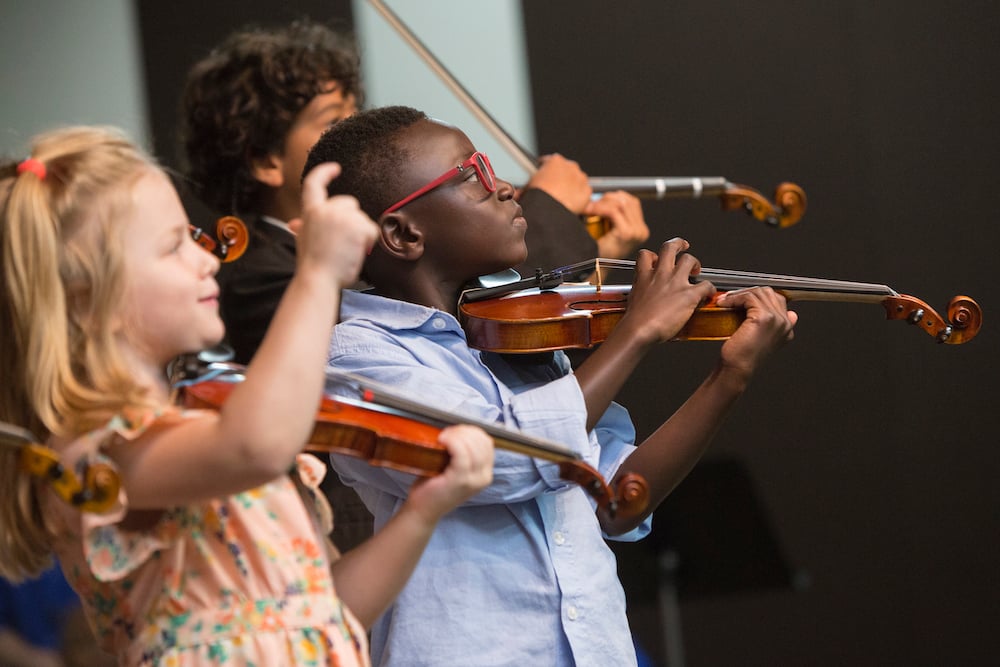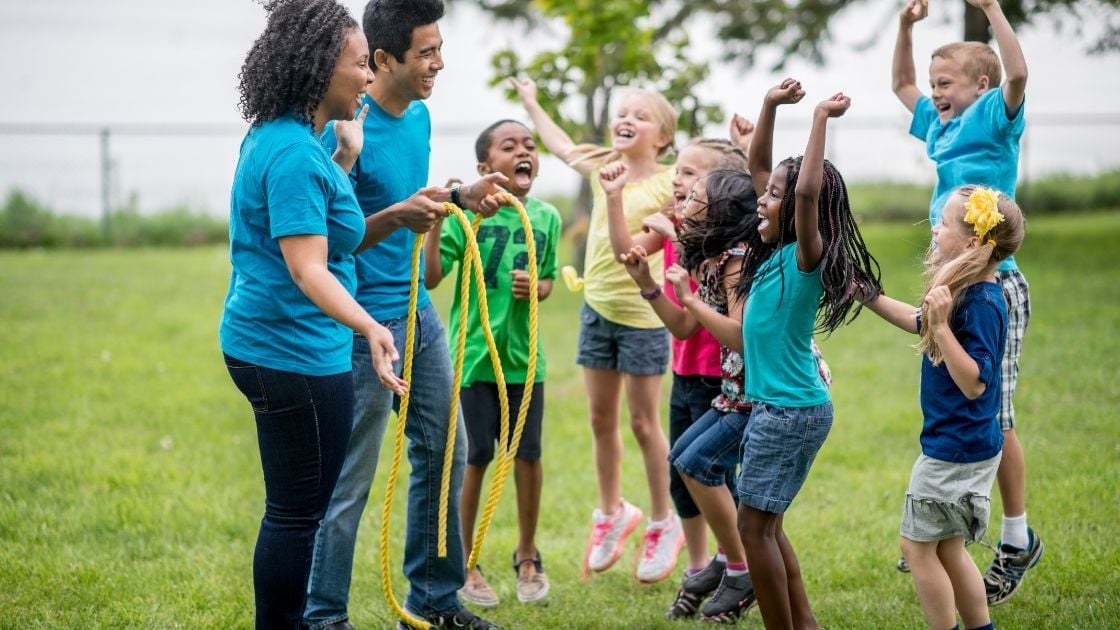Performing live on five different instruments with only three weeks to prepare may seem daunting to even the most seasoned musician — and all but impossible for beginner students — but that’s exactly what campers do at Walker West Music Academy’s Summer Music Camp in St. Paul.
The three-week day camp runs in July and is open to 30 children ages 5 to 12. This year, the camp is expanding to a full-day camp from 8 a.m. to 4 p.m. with music instruction in the morning and dance, yoga/meditation and storytelling in the afternoon.
No prior musical knowledge or experience is required to attend the camp, where children learn the fundamentals and simple tunes on violin, African drums, piano, a woodwind or brass instrument and voice.
Campers receive breakfast, lunch and snacks. Instruments are provided, too.
The camp culminates in a public concert held at Walker West’s performance hall.
And it’s all possible because of a dedicated teaching staff, a solid camp structure and student perseverance, said program director Tonya Gregory.
“It can be pretty amazing, because you wouldn’t think that all of these students would be able to do all of these different things on these instruments in three short weeks,” she said. “But because of the way the program is designed and the way the teachers teach, they’re able to learn and share a lot.”
Trusting the music
Walker West Music Academy was founded more than 30 years ago by Rev. Carl Walker, a gospel pianist, and Grant West, a jazz pianist. In 1991, the Summer Music Camp was launched.
Since its creation, Walker West has set out to foster a community centered around jazz and gospel music, which is often overlooked in public music education.
“People are coming specifically because it’s is not offered at public schools, as well as for the family feel, the connection and making sure we’re sharing the African-American cultural experience through music,” Gregory said.
In addition to its Summer Music Camp, Walker West offers a Summer Jazz Intensive for ages 12 to 18. Designed to help students already proficient in an instrument further hone their skills, the week-long camp runs from 10 a.m. to 4 p.m. in Aug 3-7.
Walker West’s executive director Braxton Haulcy said the Summer Music Camp makes for “a great entry point to becoming part of the Walker West family.”
Haulcy said senior teaching instructors have been with the school for years and offer a wealth of knowledge, while high schooler and college-age camp teaching assistants — who often grew up taking lessons at Walker West — serve as role models and mentors to campers.
Edmund Catlin, a camp assistant, studied at Walker West for five years before leaving for college, returning for summers as an administrative assistant and substitute drum lesson instructor.
“It’s really cool because my job is to serve as an intermediary between the adults, the teachers and professionals and these little kids,” Catlin said. “It’s almost like a diplomatic position.”
Jack Breen, the summer camp band instrument teacher, started taking lessons at Walker West as a fourth-grader and continued through high school. After graduating from college, he returned to teach lessons and coach ensembles.
As a recent college graduate, Breen is able to relate to students in ways that other staff might not.
“I have three different instruments out and then I’m also playing recorder and sometimes the piano with them and we just have a little dance party,” Breen said.
Catlin stressed the importance of creating a trusting relationship between campers and instructors.
“At the end of the day, music is about trust. And I think this camp does a good job at giving these kids trust,” he said. “We want them to trust us and trust the music.”
Playing to learn
Students arrive at Walker West at 8 a.m. and eat breakfast as a group before breaking off into small groups for rotational lessons in various instruments. After music lessons, campers eat a snack and then head to group choir, where all 30 students sing together in the performance hall. Lunch is served at about noon.
Meals and snacks are provided through Saint Paul Public Schools, which is just one of the ways Walker West makes its camps accessible to all children. Scholarships are also provided to students in need, and Walker West was recently certified by the Minnesota After School Advance Program, which enables the school to further expand on its commitment to providing instruction for all.
Part of the reason the Summer Music Camp is so successful in introducing beginner students to a range of instruments and techniques is because it incorporates a concept Haulcy calls “Play to Learn,” which means campers focus on listening to melodies and rhythms and playing by ear before reading and writing music, similar to how children learn to speak before learning to read or write.
This teaching style also helps campers develop an enhanced skill for improvisation.
Breen said he starts with recent songs that campers know such as Baby Shark or Old Town Road.
“I want to get students to learn music they really love first — that’s my first priority because that really gets the excitement going,” Breen said.
The fact that violin is included among the camp’s core instruments may surprise some folks, Haulcy said. However, Walker West includes the instrument because the school is known for its fantastic string program, one of the best in the U.S., with four instructors teaching violin, viola, cello and bass.
“Many of our students are playing in the symphonies across the Twin Cities,” Haulcy said. “And some have played at Carnegie Hall with Sarah Chang.”
Life lessons
But it’s not just about building up world-class musical skills. During camp, kids also learn discipline, determination and tenacity.
“It takes a lot of confidence to play five instruments at a beginner’s level — and that’s a major accomplishment of the program,” Haulcy said.
Campers learn their strengths and what they enjoy as well as how to articulate their preferences. Walker West’s emphasis on teaching non-academic skills like these in addition to its musical curriculum distinguishes the program from other camps, Breen said.
Catlin said his measure for a successful lesson is whether the child leaves knowing how to do something new.
And sometimes that simply means learning to be OK with mistakes.
“Little kids tend to be perfectionists a lot of the time, so a lot of it is trying to persuade them that going as far as you can go is worth it, in and of itself,” Catlin said.
“You’re constantly in pursuit of this thing that’s always running away from you — and that’s always bigger than you — so a lot of the camp is inviting kids to trust that world of music, of ‘Who knows what will happen?’ But the only way to find out is to do it.”
Helen Sabrowsky is a University of Minnesota journalism student. She served as a summer writing intern at Minnesota Parent.






















